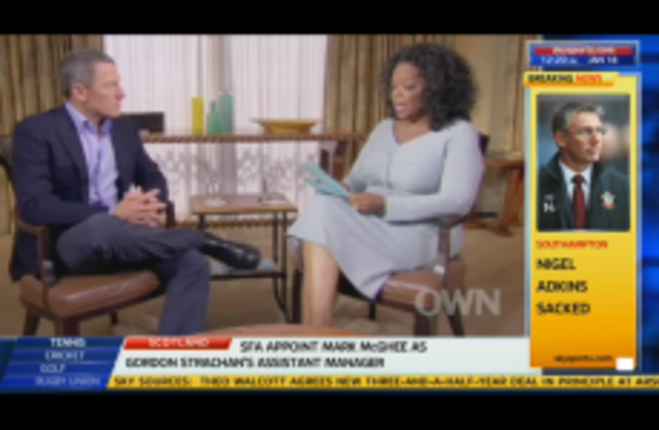THE MOST EFFECTIVE part of Oprah Winfrey’s interview with Lance Armstrong came right at the beginning: Five questions, five one-word answers — each of them the same.
“Yes or no,” Winfrey said. “Did you ever take banned substances to enhance your cycling performance?
“Was one of those banned substances EPO?
“Did you ever blood dope or use blood transfusions to enhance your cycling performance?
“Did you ever use any other banned substances like testosterone, cortisone or human growth hormones?
“In all seven of your Tour de France victories, did you ever take banned substances or blood dope?”
Yes, yes, yes, yes and yes. In what Winfrey has called the most important interview of her television career, she couldn’t be accused of burying the lead. It set up everything that followed in the first, 90-minute segment of Armstrong’s confessional (Part two is set to air tonight – we’ll liveblog the broadcast).
The passage also established that the disgraced cycling champion had spent much of his life as an aggressive liar and weakened a lot of what was to follow as a viewing experience. Armstrong even admitted it at points. He knew people tuning in would have a hard time believing much of what he said. There were no tears, no pleading for sympathy. Armstrong was a beaten man, and he knew it.
For Winfrey, it was a particularly challenging interview. She needed to get in the weeds of technical material involving drugs, investigations and a huge cast of characters and accusations. Yet it was important not to get lost in those weeds, to keep sight of the human element, and for the most part she handled it ably.
Winfrey discussed the accusations that Armstrong had essentially led the doping program involving his cycling team, putting pressure on teammates to join him and race dirty. Armstrong said he never explicitly told teammates they had to dope — despite testimony to the contrary that Winfrey reported — but acknowledged that his own position as the team leader amounted to implicit pressure.
Bully
Winfrey recognised that for what it was: semantics. Then she abruptly switched gears to ask Armstrong: “Were you a bully?”
It was a talk show host’s question, not necessarily a journalist’s. And it was brutally effective. Armstrong seemed initially taken aback but admitted to it and explained what led to his behaviour.
She showed tapes of Armstrong’s aggressive denials through the years and explained how he often set his lawyers on old friends or colleagues that accused him of doping.
“You’re suing people and you know they’re telling the truth?” Winfrey said. “What is that?”
“It’s a major flaw,” Armstrong answered, blandly. Winfrey could have come at him even harder.
In an especially chilling and effective passage, Winfrey got Armstrong to admit he didn’t feel what he was doing was wrong at the time. He didn’t feel like he was cheating. Winfrey showed some nervousness after the interview’s strong opening that manifested itself in interrupting Armstrong before he could fully answer a question. An effective TV interviewer needs to know when to give the subject some space and when to bore in, and Winfrey mostly achieved that mix after settling down.
After Armstrong batted away a general question about the doping culture — “how did it all work?” — Winfrey quickly learned to be specific in these discussions. At one point Armstrong acknowledged calling one former friend who had turned on him crazy and a bitch, “but I never called her fat.” It was ridiculous, and Winfrey should have called him on it.
Winfrey’s struggling OWN network took advantage of the high-profile interview by using virtually every commercial break to promote its other programming. The time between commercial breaks shortened to the point of distraction in the final third of the 90-minute program.
Winfrey asked the most pressing question after Armstrong got his admissions out of the way at the top of the show.
“For 13 years you didn’t just deny it, you brazenly and defiantly denied everything you just admitted right now,” she said. “So why now admit it?”
Armstrong acknowledged the importance of the question, and said he had no real answer. One suspects that if the question is asked again, and yet again if need be, that an answer might emerge. That’s something to look forward to in Friday’s Part two.

